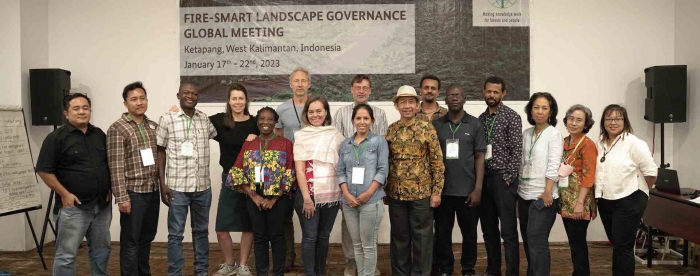Workshop Lanskap Cerdas Api di Ketapang

Indonesia - 22 February, 2023
Kebakaran merupakan keprihatinan banyak negara di berbagai belahan dunia dengan dampaknya yang hebat bagi manusia, alam, dan keanekaragaman hayati. Situasi ini menjadi semakin parah dengan adanya dampak perubahan iklim dan faktor antropogenik dalam bentuk perubahan tata guna lahan maupun praktik-praktik yang tak bersahabat dengan lingkungan. Semakin parah kebakaran yang terjadi, semakin buruk bencana yang diakibatkannya bagi manusia dan lingkungan, memperburuk perubahan iklim dan menyumbang gas rumah kaca ke atmosfer.
Dengan tujuan yang sama untuk menghadapi tantangan akibat dampak kebakaran di kawasan tropis, perwakilan dari jaringan global Program Lanskap Cerdas Api, sebuah proyek yang dipimpin oleh Tropenbos International (TBI), berkumpul di Kabupaten Ketapang, Kalimantan Barat pada pertengahan Januari 2023 lalu. Tropenbos Indonesia menjadi tuan rumah, dan peserta yang hadir datang dari Bolivia, Uganda, Ghana, Ethiopia, dan Belanda. Ini juga merupakan kesempatan bagi para peserta untuk belajar langsung tentang inisiasi pencegahan kebakaran yang dilakukan oleh Tropenbos Indonesia di kawasan lahan gambut Lanskap Pawan-Pesaguan (PP) di Ketapang, Kalimantan Barat.
Lanskap Pawan-Kepulu-Pesaguan terdampak parah oleh kebakaran yang melanda pada musim kemarau panjang di 2015 dan 2019. Di lanskap ini, Tropenbos Indonesia telah memperkenalkan diadopsinya pendekatan lanskap dan jurisdiksi untuk menurunkan risiko kebakaran. Dengan lahan gambut terdegradasi di lanskap, termasuk di kawasan yang memiliki kedalaman gambut > 3 m, upaya pencegahan kebakaran harus mencakup pendekatan restorasi lahan gambut, terutama dalam meningkatkan manajemen air. Peningkatan tata kelola lanskap secara menyeluruh juga merupakan kunci keberlanjutan penerapan dan dampaknya dalam jangka panjang. Tropenbos Indonesia mempromosikan pencegahan kebakaran dengan mengadopsi pendekatan terintegrasi di lanskap, bersama dengan Pemerintah Kabupaten dan berbagai pemangku kepentingan lainnya.
Ketika para peserta mengunjungi kawasan gambut, sebagian besar dari mereka mengakui bahwa mereka tidak memiliki pengalaman dengan gambut karena gambut tidak ada di negara mereka. Lahan gambut secara alamiah merupakan ekosistem lahan basah, dengan karakteristik istimewa yang membuatnya rentan terbakar bila mengering. Ketika gambut kering terbakar, meski hanya oleh setitik api, kebakaran akan dengan cepat menyebar dan tak mudah dipadamkan. Ketika kebakaran besar terjadi pada 2019, Kalimantan Barat merupakan salah satu provinsi dengan kebakaran yang luas dan mengundang protes dari negara-negara tetangga akibat asap yang timbul. Ini menunjukkan betapa pentingnya upaya pencegahan kebakaran untuk melindungi gambut agar tidak terbakar daripada memadamkan kebakaran bila terlanjur terjadi.
Para peserta juga bertemu dengan anggota forum pemangku kepentingan lanskap, yang dibentuk sebagai forum negosiasi dan konsultasi dalam berbagai proses. Mereka juga mengunjungi petani mandiri kelapa sawit di lanskap, melakukan diskusi dengan masyarakat dan bertemu dengan kelompok perempuan yang mengembangkan industri rumahan produk lokal, seperti keripik batang pisang. “Inovasi aneh yang bisa dimakan,” komentar seorang peserta. Mereka juga mengunjungi Yayasan International Animal Rescue Indonesia (YIARI), di mana para peserta bisa melihat langsung pendekatan YIARI dalam merehabilitasi orangutan sebelum mereka dilepasliarkan kembali ke habitatnya.
Selama dua hari, para peserta menggunakan waktu mereka untuk melakukan refleksi, pembelajaran, dan perencanaan. Dari sesi-sesi tersebut, selain mengenali beberapa perbedaan dalam konteks terkait isu kebakaran, para peserta juga menemukan kesamaan dalam pendekatan dan model antar negara. Salah satu contohnya adalah pendekatan pengawasan gambut yang dikembangkan dalam sebuah sistem yang disebut “Pemantauan Gambut” di Indonesia, yang juga ada di Ethiopia dengan pasukan pemadam kebakarannya yang berbasis masyarakat. Pendekatan lain yang mirip adalah kolaborasi para pemangku kepentingan di lanskap melalui Pokja para pemangku kepentingan (MSWG) di Indonesia dan forum pemangku kepentingan (MSP) di Ethiopia. Selama sesi, para peserta juga mendiskusikan sejumlah topik terkait dengan penguatan masyarakat, pembelajaran kolektif, tata kelola yang baik, dan peningkatan praktik dan kebijakan.
***






